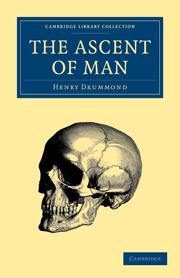Book contents
- Frontmatter
- Preface
- Contents
- THE ASCENT OF MAN
- INTRODUCTION
- CHAPTER I THE ASCENT OF THE BODY
- CHAPTER II THE SCAFFOLDING LEFT IN THE BODY
- CHAPTER III THE ARREST OF THE BODY
- CHAPTER IV THE DAWN OF MIND
- CHAPTER V THE EVOLUTION OF LANGUAGE
- CHAPTER VI THE STRUGGLE FOR LIFE
- CHAPTER VII THE STRUGGLE FOR THE LIFE OF OTHERS
- CHAPTER VIII THE EVOLUTION OF A MOTHER
- CHAPTER IX THE EVOLUTION OF A FATHER
- CHAPTER X INVOLUTION
CHAPTER V - THE EVOLUTION OF LANGUAGE
Published online by Cambridge University Press: 05 October 2010
- Frontmatter
- Preface
- Contents
- THE ASCENT OF MAN
- INTRODUCTION
- CHAPTER I THE ASCENT OF THE BODY
- CHAPTER II THE SCAFFOLDING LEFT IN THE BODY
- CHAPTER III THE ARREST OF THE BODY
- CHAPTER IV THE DAWN OF MIND
- CHAPTER V THE EVOLUTION OF LANGUAGE
- CHAPTER VI THE STRUGGLE FOR LIFE
- CHAPTER VII THE STRUGGLE FOR THE LIFE OF OTHERS
- CHAPTER VIII THE EVOLUTION OF A MOTHER
- CHAPTER IX THE EVOLUTION OF A FATHER
- CHAPTER X INVOLUTION
Summary
If Evolution is the method of Creation, the faculty of Speech was no sudden gift. Man's mind is not to be thought of as the cylinder of a phonograph to which ready-made words were spoken and stored up for future use. Before Homo sapiens was evolved he must necessarily have been preceded for a longer or shorter period by Homo alalus, the not-speaking man; and this man had to make his words, and beginning with dumb signs and inarticulate cries to build up a body of Language word by word as the body was built up cell by cell.
The alternative theory of the origin of Language universally held until lately, and expressed in so many words even by the eighth edition of the Encyclopædia Britannica, that “our first parents received it by immediate inspiration” has the same relation to exact science as the view that the world was made in six days by direct creative fiat. Both are poetically true. But to science, seeking for precise methods of operation, neither is an adequate statement of now ascertained facts. The same processes of research that made the poetic view of creation untenable in the physical realm are now slowly beginning to displace the older view of the origin of speech. That Language should be outside a law whose universality is being established with every step of progress is itself improbable; and now that the field is being exhaustively explored, the proofs that it is no exception multiply on every side.
- Type
- Chapter
- Information
- The Ascent of Man , pp. 195 - 240Publisher: Cambridge University PressPrint publication year: 2009First published in: 1894



